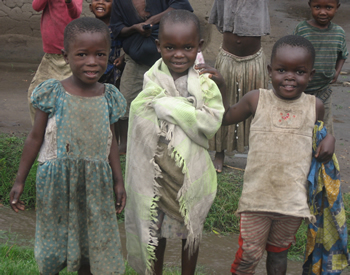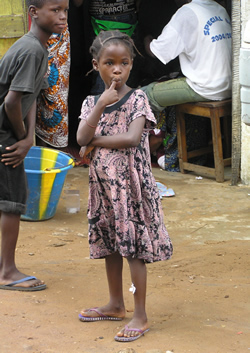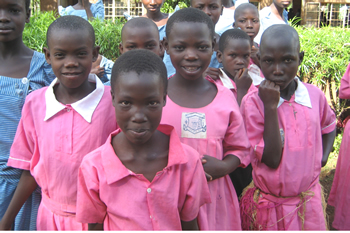Look at Me!
World AIDS Day 2011
A guest essay by Arthur J. Ammann, MD, President and CEO of Global Strategies for HIV Prevention. Art Ammann was the former Director of the Pediatric Immunology and Clinical Research Center at the University of California Medical Center in San Francisco. In the summer of 1981, Ammann cared for a woman who was a prostitute and intravenous drug user and three of her children. All four presented with unusual deficiencies in their immune systems that were aggravated by opportunistic infections that did not fit normal medical models of disease. He determined that the mother and all three children had contracted AIDS, a tragic diagnosis because the disease was at that time fatal. Perhaps equally devastating was the disturbing conclusion, hotly contested and very controversial at the time, that HIV-AIDS was not limited to adults. Ammann determined that HIV had passed from the mother to her children as an "acquired" and not an "inherited" disease. In 1982, he thus documented the first cases of AIDS transmission from mother to infant, and also the first blood transfusion AIDS patients.
For Sunday December 4, 2011
Second Sunday in Advent
Lectionary Readings (Revised Common Lectionary, Year B)
Isaiah 40:1–11
Psalm 85:1–2, 8–13
2 Peter 3:8–15a
Mark 1:1–8
“Comfort, yes, comfort my people, says your God," we read in the lectionary for this week (Isaiah 40:1).
As I travel to some of the most neglected regions of the world where the HIV epidemic has raged for over 30 years, I see the reality of this epidemic and its disproportionate impact on children. The number of children affected by the HIV epidemic increases each year almost as if the numbers are simply meant to convey what we already know — that not much is being done to care for those who are orphaned or to slow one of the most neglected complications of the HIV epidemic. None of this, of course, is of much comfort to the orphaned children.
 |
AIDS orphans. |
I look into the faces of the orphaned children I meet, and often wonder what they are thinking as they struggle each day to survive. What is it like, for example, to get up as the sun rises and realize that it is unlikely there will be enough food for the day, or that you will again stand and watch all the other children go to school with their books and uniforms while you remain still and staring. I also wonder if they look at me, or any visitor like me, as an individual who might, just might, change their daily lives and their future. Or maybe they have gotten so used to visitors from foreign lands who come and look and listen and then never return that their hopes never reach the level that creates disappointment.
In the most remote and least visited orphan programs the children run up to and surround visitors, grab their hands, and at the urging of the local caretakers, often sing a song of welcome. In spite of their enthusiasm, these orphans are frequently the most impoverished, and yet, somehow, they manage a smile that breaks through their obvious poverty. It moves me to see so many orphans in need and to watch individual children jockeying to the front to get a space where they will be more visible. It reminds me of the scene in the movie Cider House Rules, adapted from the 1985 novel by John Irving, where the orphan children line up waiting to be adopted and shout out to the potential parents, "Look at me, look at me." Today the HIV orphan epidemic needs to be made visible and needs to be seen as individual children who deserve the love and care that all children long for.
On this World AIDS Day I am more worried than ever about the HIV orphan epidemic. Perhaps I shouldn't be. Maybe some big international organization or some large nongovernment organization or a benevolent government will take up the cause. But in reality there are too many orphans and so someone's got to worry, and in fact, a lot more people need to be moved to worry. We all need to recognize that there is an entire generation of children orphaned by the HIV epidemic that are in desperate need of being rescued. Just as Jesus recognized the potential of the children who sat at his feet and refused to send them away at his disciples urging, we need to acknowledge that orphans are also welcomed inhabitants into the kingdom of heaven.
 |
AIDS orphan. |
In 2011 the orphan crisis looms large. So large, in fact, that many will turn their eyes away, overwhelmed by the enormity of the need. Currently it is estimated that there are over 16 million orphans worldwide, with 6 million added to that number each year. Less than 20% of the orphans are infected with HIV. The majority have escaped HIV infection but not orphan hood. In two to three years there will be more orphans as a result of the HIV epidemic than there are adults living with HIV.
Every life is important, but over the last decades the priorities for the HIV epidemic have been to provide education to adults to help them to protect themselves from getting HIV infection, or if they are already infected, to provide them with drugs to control their infection so that they will have a normal life expectancy. All this is extremely important. But the orphan crisis is a direct consequence of placing their needs at an unacceptably low priority. Children do not choose to become orphans of the epidemic, nor is there a magic medicine that will erase their orphan status.
Worrying is the beginning. There's a lot that we can and should do. Women need to be protected from unwanted HIV infection that destroys their lives and that of their family. If infected, they need access to life-saving medicines to keep them healthy so that they can provide for their children and prevent them from becoming orphans in the first place. Pregnant women can also be given medicines to keep the virus from being transmitted to their infants. Advocacy is required to protect women from physical violence, the major source of unwanted HIV infection. Donations will help provide medicines to keep mothers healthy and prevent children from becoming infected. Donations can also purchase food to provide severely malnourished children with nutrition so that the medicines work. This can be done for one orphan, or for two, or for five, or for 10, or even for 100 children, providing orphans with the comfort that there are individuals who believe that they have a responsibility to care for the widows and the orphans of this world.
 |
AIDS orphans. |
The severity of the orphan crisis may not be on the radar screen of all of the big organizations or for that matter most Christians. Orphans need advocates because they cannot advocate for themselves. As Marion Wright Edelman stated so clearly, “Having lobbied for children’s rights issues in Washington, DC, over the past 18 years, I am convinced that the new direction will not come from inside the political process. Politicians love to make speeches about families and children, but when they get back to Washington and budget battles, kids are the last to cross their minds. Kids don’t vote. And political leaders respond to three things: threats to their reelection, potential embarrassment in the media, and the promise of campaign contributions. Children don’t make campaign contributions, and many of their parents are too busy struggling to make ends meet to get involved in campaigns. If change is to come, it will happen because people like you respond in an aggressive, sustained, and even outraged way.”
We are in good company when we advocate for orphans. We join with God, the prophets and Jesus in urging the Christian community to care for the widows and the orphans of this present world. It will be a tragedy if the Christian community looks back years from now and says that more should been done to rescue the oppressed.
In Isaiah chapter 40:11 we read, "He tends his flock like a shepherd: he gathers the lambs in his arms and carries them close to his heart; he gently leads those that have young." In the flock I see not just individuals, couples and families. I also see widows and orphans. God has given us the privilege of gathering them together and bringing them close to his heart.
"Pure and undefiled religion before God and the Father is this: to visit orphans and widows in their trouble, and to keep oneself unspotted from the world." James 1:27.
Image credits: (1–3) Arthur J. Ammann, MD.





